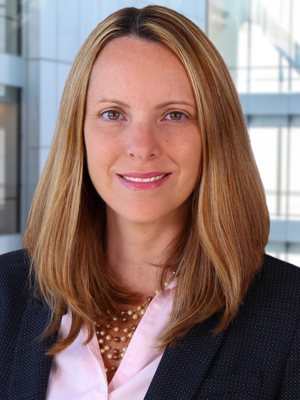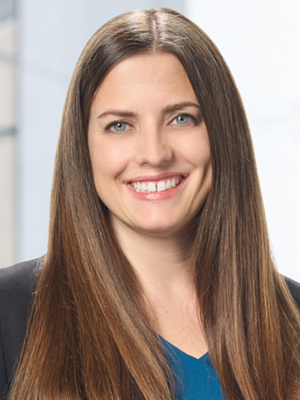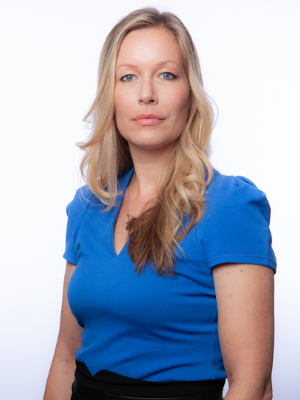 “It’s important to embrace change and demonstrate adaptability as you grow in your career,” says Heather Garland. “This helped me develop a well-rounded, transferable skill set.”
“It’s important to embrace change and demonstrate adaptability as you grow in your career,” says Heather Garland. “This helped me develop a well-rounded, transferable skill set.”
Garland shares how a growth mindset, being flexible, and viewing challenges as stepping stones can help build the skills and experience for a successful career. Her passion for nurturing her team’s development mirrors her dedication to driving business success, believing that both are not mutually exclusive.
Pursuing opportunities for growth
Garland’s career has been one of continuous growth and reinvention. In college, Garland majored in psychology and wasn’t sure what career path she wanted to pursue. While finishing her degree at night, she took a sales assistant role at AXA and was eventually recruited to join PGIM, where she has now spent more than 25 years building a successful career. Though she didn’t know much about financial services at the time, Garland saw her first role at PGIM as an intriguing challenge.
Dedicated to advancing her career and learning the industry, Garland seized every opportunity through lateral moves, stretch assignments, and professional designations, like the FINRA Series 7 and CIMA certifications.
“There were times I pursued growth opportunities, and other times I was tapped on the shoulder to lead different areas as part of a strategy shift,” she says.
One of those pivotal moments came twelve years ago when Garland transitioned into Marketing, leading marketing communications, product marketing and more recently, client marketing. These experiences became the foundation that launched her into her newly appointed role as Global Chief Marketing Officer, where she leads a team that is shaping the future of PGIM Investments’ marketing strategy.
“There are a number of initiatives and pilot programs underway that ultimately will help drive business growth and enable us to deliver better experiences for our clients,” she says.
Fostering the development of others
For Garland, few things are more rewarding than guiding others as they advance in their careers. She explains, “One of the most fulfilling aspects of my role is helping high performers grow and pursue their goals. I’ve had a number of team members who have moved on to other roles within PGIM or externally. I feel like a proud parent when I see someone take that next step in their career.”
Not only does Garland invest in the growth of her team members, but she is committed to supporting up-and-coming women across PGIM, as she recognizes what a difference it made for her own career.
“I was part of the first pilot program in PGIM Investments, in which I was paired with a mentor outside of my direct team. That experience opened doors for me, eventually leading to my current role.”
Taking leadership to the next level with an executive coach
Beyond the support of mentors and managers in her organization, Garland credits working with a leadership coach as instrumental in shaping her career development. She points to the accountability of meeting with a coach on a regular basis and working on specific goals as beneficial.
“With my coach, I developed a roadmap to focus on building strategic, one-on-one relationships with senior decision-makers in the organization – people I often needed to gain support from or collaborate with. One of the most valuable relationships I’ve built through that process is with our head of sales – a connection who was open and happy to meet with me as part of the growth plan I initiated.”
Another aspect of the coaching experience that Garland finds impactful is receiving input from her peers and leaders as part of a 360-feedback report, giving her the opportunity to reflect on her strengths and potential areas of growth from a multitude of perspectives. This feedback enabled her to create a plan around what to start – and stop doing – to focus on what matters most in her role.
She reflects, “I was also able to look at my functional area differently and recommend a new organizational structure that better aligned with where our business was headed.”
Lessons learned
After 25 years at PGIM, Garland understands that becoming an effective leader requires both time and experience to develop the necessary skills and confidence. She highlights the importance of focusing on progress rather than striving for perfection.
Another key element for career success that Garland emphasizes is self-advocacy. “Whether it’s being considered for a stretch project, a promotion, or a raise – don’t be afraid to ask for what you want. The worst response you’re going to get is ‘No,’ and even that gives you the opportunity to start a dialogue.”
“I used to have the mindset that if I kept my head down and worked hard, I’d be recognized for that and promoted in time. But, in reality, it doesn’t always work out that way. It wasn’t until I started becoming more intentional and vocal about my career goals that those opportunities finally started to come.”
Leaving time for adventure
Outside of work, Garland enjoys spending time with her family and exploring new places with her husband and two kids, both near and far – they took a recent trip to Nicaragua. She also finds joy experimenting in her kitchen – when she has time – and reading, preferably on a beach.
“I don’t think there’s such a thing as work-life balance. I view it more like a seesaw,” Garland says. “There are times where you may need to focus more on work, and times where you need to focus more on your personal life. As leaders, it’s important to understand that for our team members as well.”
By Jessica Robaire



